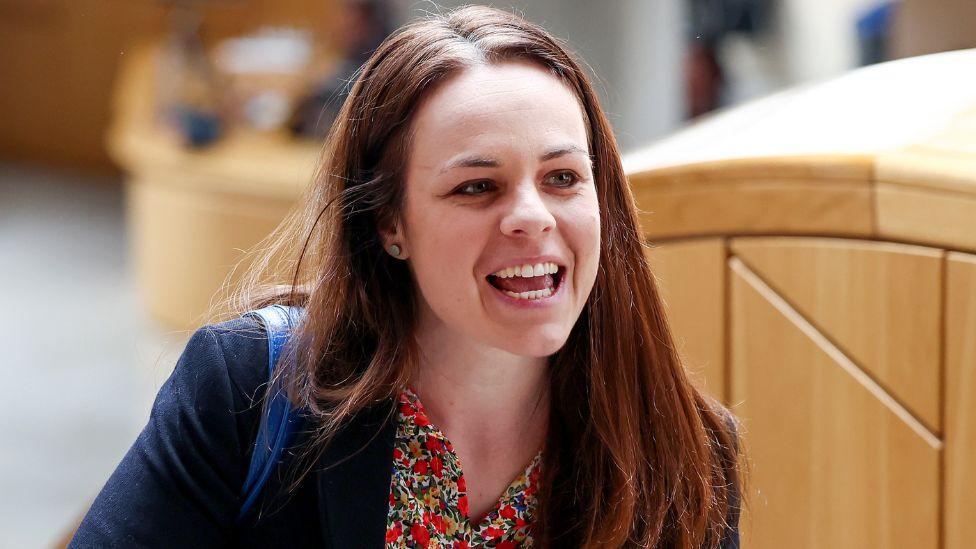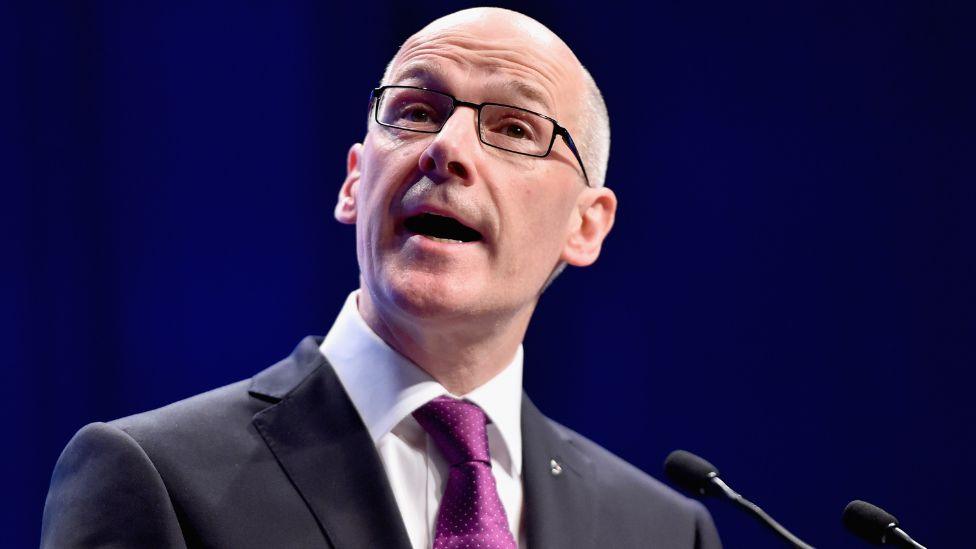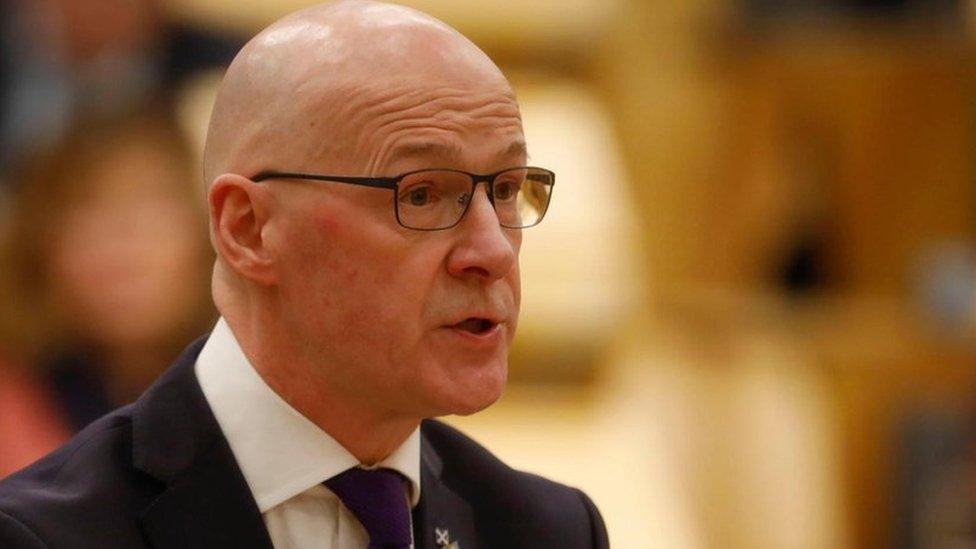Humza Yousaf says he 'paid price' for upsetting Greens
- Published
"That's on me" – Humza Yousaf reflects on end of his time as first minister
Outgoing First Minister Humza Yousaf has said he "paid the price" for the way he ended the SNP's power-sharing deal with the Scottish Greens.
Speaking for the first time since announcing his resignation, Mr Yousaf told BBC News ending the Bute House Agreement was the "right decision".
"But I have to acknowledge the manner in which I did it caused great upset and that's on me," he said.
Mr Yousaf announced on Monday that he would resign as first minister.
He intends to remain in office until a new SNP leader is named.
A motion of no confidence in his government, which would have forced all SNP ministers to resign, was defeated by 70 votes 58 in the Scottish Parliament on Wednesday.
Mr Yousaf said it was clear to him that the SNP's power-sharing deal with the Scottish Greens was "coming to an end anyway".
Green members had been asked to vote on whether to end a power-sharing deal with the SNP after it scrapped key climate change targets, and there was also disquiet from some within his own party about the alliance.
He said: "In my mind, whether it was a matter of days or weeks, the Bute House agreement was coming to an end.
"That's why I say that ending the Bute House agreement was the right thing to do for the party and the country.
"But I accept fully the manner in which it was done clearly caused upset and therefore I've paid the price of that."
The first minister insisted he did not regret ending the deal, adding: "I just regret the manner in which I ended it".
Tension between the parties had increased following the announcement that NHS Scotland was pausing prescribing puberty blockers to under-18s referred by the country's only specialist clinic, following a report by Dr Hilary Cass.
Mr Yousaf said Green co-leader Patrick Harvie's response to the move - including his refusal to accept the Cass review as a valid scientific document - had "upset a lot of people" in the SNP but that it was "not necessarily" a factor in ending the Bute House Agreement.
Humza Yousaf said Patrick Harvie's refusal to accept the scientific validity of the Cass review on gender services upset a lot of people within the SNP
Mr Yousaf announced his intention to step down as he faced two no-confidence votes tabled by opposition parties following the turbulent ending of the Bute House Agreement - a deal signed by his predecessor Nicola Sturgeon three years ago that brought two Green ministers into government.
Former Deputy First Minister John Swinney and ex-Finance Secretary Kate Forbes have emerged as the frontrunners in the process to succeed him, although neither has yet declared they are standing.
Mr Yousaf said he would not endorse either potential candidate.
He called for unity within the party and urged any potential candidates not to openly criticise their rivals.
"We will gain nothing if we talk each other down," the first minister said. "The only people who benefit from that are our opponents."

Former finance secretary Kate Forbes narrowly lost out to Humza Yousaf in the 2023 leadership contest
Ms Forbes, who narrowly lost out to Mr Yousaf in the 2023 leadership contest, was criticised during the campaign for revealing she would have voted against gay marriage legislation had she been an MSP at the time due to her religious beliefs as a member of the Free Church of Scotland.
When asked if he felt Scotland could have a first minister who opposed gay marriage, Mr Yousaf said: "You can be a person of faith and be first minister."
"What people will judge any potential candidate on are their policies," he said, adding: "That is the right discussion to have - not whether somebody of faith can be first minister."
Both Mr Swinney and Ms Forbes have said they are considering SNP leadership bids but that they need to consider what they feel is right for their families, party and country.
A source close to Mr Swinney, who led the party between 2000 and 2004, told BBC Scotland News he had no plans to make an announcement on Wednesday.
He has been backed by several senior party figures, including Westminster leader Stephen Flynn, deputy leader Keith Brown and cabinet ministers Neil Gray, Shirley-Anne Somerville and Mairi McAllan.

Former deputy first minister John Swinney has been backed by several high-profile SNP figures
Ms Forbes has been publicly supported by ex-ministers Fergus Ewing and Ivan McKee, as well as backbench MP Joanna Cherry.
Allies of Ms Forbes told BBC Scotland News she had made progress planning a potential leadership bid, including on policy positions and resources, in case she decided to stand.
Her supporters said she was not expected to make an announcement on Wednesday as it had only been 48 hours since Mr Yousaf announced his resignation.
Nominations for the SNP leadership opened on Monday and will close in one week. If more than one candidate receives 100 nominations from at least 20 local party branches, a ballot will be held among members to decide on a new leader.
Mr Yousaf has said he will resign as first minister once a new leader is chosen. At that point, parliament would have 28 days to nominate new first minister to be appointed by the King.
If MSPs could not reach an agreement after 28 days, a snap election would be called.
No confidence vote
One of the no-confidence motions, directed at the first minister himself, was pulled by the Scottish Tories, who said it had served its purpose.
A separate motion of no confidence in the whole government, tabled by Scottish Labour, was defeated on Wednesday afternoon.
The result was in little doubt after the Greens, whose votes would be required to give the opposition a majority, called for it to be withdrawn following the first minister's resignation announcement.
If it had passed, the motion would have compelled the entire government to resign, with parliament given 28 days to nominate a new first minister. Failing that, a snap election would have been called.
- Published6 May 2024
